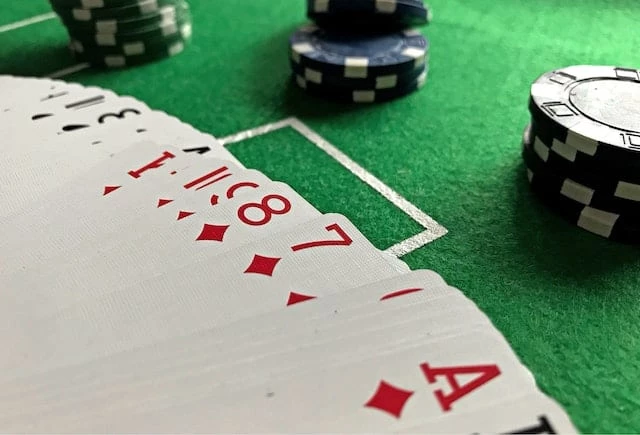 Article Contributors
Article Contributors Poker Strategy Tips
While many consider poker a game of luck, poker is, in fact, a game of strategy, patience, and mathematics where every poker tip matter. To be good, players need to have knowledge, be able to read the game, and play their hands right. Even if it involves folding, going all in, and taking on the entire table, making the ideal strategic moves can help improve your game and turn you from a fish into a shark. Here are some of the things you need to consider when playing poker!
Select a Few Hands and Play Them Aggressively
Hand selection can’t be overstated in poker. It always depends on the type of game you’re playing, but in most cases, you should be aggressive when you have a good hand. You have to play in a tight range and always be ready to re-raise to take players off weak hands and show you’re dominating them. The key is to make the most of your suited cards and pocket pair and exert pressure on your opponents. A win is a win; even if you win a two-blind pot, it’s better than losing a two-blind pot!
Avoid Being the First Player to Limp Into a Pot
At the right time, limping can be a powerful online poker strategy. In poker, you must make polarizing calls to get players off their game. When you’re the first to limp, in most cases, you’re giving off a vibe of a weak holding. This is because you’re out of position, and other players who have yet to act can 3-bet or go all in. A better decision is to raise or fold and only limp in some cases.
Employ Aggressive “Semi-Bluffing” with Your Drawing Hands
Semi-bluffing is a strategy that can lead to excellent results when used correctly or spun to indicate a strong hand. This strategy is wrongly used by new players who don’t know what to do when they don’t hit the “nuts.” Players must bet aggressively from the start to show they hold a strong hand to make this an effective strategy. Even if they don’t reach their desired goal when betting drawing hands, they can still turn their hands into a bluff and win the pot on the river. This strategy can be very effective because it gives you two ways to win in poker: either your opponent’s fold or you hit your draw and have a strong hand.
Quickly Build the Pot and Maximize Earnings with Your Strong Hands
When you know you have a strong hand, the common misconception is to trap your opponents. However, the best strategy to implement then is to start betting big from the get-go and build the pot up even pre-flot. This means playing aggressively, betting more than 50% of the pot in order to scare your opponent and maximize your winnings when the showdown comes.
Protect Your Big Blind with Appropriate Hands
Having a strategy for your post-flop game is essential because you can defend and start playing out of position with the right hands. While a big blind is dead money, if you choose to fold, you can still defend the position with the right types of hands. It doesn’t mean playing every hand, but pocket pairs, connectors, and suited cards can be hard to read, especially from the big blind.
Choose to Fold When Uncertain About Your Hand
Profitable poker players are the ones who also know when to fold. Folding is actually more important in poker than calling since it can get you out of uncomfortable situations. So, if you’re uncertain about how you weigh against your opponents or whether you have your read done correctly, it’s always better to fold than make a risky call. It’s also advisable to fold before there’s no turning back (even during the flop pre-flop)
Exploit Opponent Weaknesses by Attacking at the Right Time
To become a good poker player, you must develop a set of skills that include playing the probabilities and making reads to the player. That’s a bit difficult in online play, but you can still use data to assess your actions. During live play, however, you can read your opponents’ habits and identify when they have a weak hand and bluffing. You might not always get it right, but you can take calculated risks to steal a pot using just a minimum raise.
Adopt a Solid Poker Strategy in Early Tournament Stages (Focus on Skill, Not Just Survival)
The ways to win poker vary depending on the type of game you’re playing. In tournament play, it’s important to go through the stages but not only focus on survival. Instead, it would help if you opted to play correct poker, taking some risks in the early stages when there are a lot of blinds and playing tight poker in the later stages of the game. Sure, getting in the money is important, but how you do it can dictate the course of your tournament.
Participate Only When You’re in the Right Frame of Mind
Poker is a game that requires concentration, patience, and emotional control. If you’re feeling tired, stressed, or emotionally upset, it’s often best to avoid playing. Your mental state can greatly affect your gameplay, and playing when you’re not in the right frame of mind can lead to poor decisions.
Engage in Games That Offer Favorable Conditions
The type of games you play can influence the outcome. For example, if you’re a poker pro and play a $1 tournament, you’ll likely get calls very often, so bluffing is not an option. Good online poker tips will tell you that you have to adapt your gameplay to match your audience. Most importantly, you have to feel comfortable playing for a specific amount to be within your skill level. Players often enter games with higher buy-ins just to be suffocated by better players. Playing games that make you feel comfortable leads to higher winning chances.
Poker Factors to Keep in Mind

Implementing any single one of these techniques will improve your play and profitability, implement about half of them and you will be ahead of 99% of poker players. Implement all of them and you will make a long-term, consistent profit as a winning poker player!
Play, Analyze, Study, Repeat
Play, analyze, study, repeat is the essential grind you must undertake for thousands of hours over multiple years in order to become a winning poker player.
There are no shortcuts, you have to have discipline and put in the work. The work is to play a lot of poker, analyze your own and your opponent’s hand histories, and study poker. That is how to improve your profitability.
For analysis of online play use poker tracking software. For analysis of the live play, you have to diligently keep your own records with detailed notes.
For study; read poker books, listen to poker podcasts, participate in poker forums, watch poker training videos and discuss poker with high-level players in real life and online.
Be Process-Oriented, Not Results-Oriented
Variance is a beast. In the short term, you can do everything right, play optimally, get unlucky and lose. You can also donk it up and win. However in the long run doing everything right and playing well will result in profit and donking will result in loss.
To develop and follow a process that will allow you to play well. Do not concentrate on short-term results.
Manage your Bankroll
Keep your poker roll separate from your life roll.
Play at small enough stakes that your bankroll can withstand long downswings. For online poker, this is roughly
- Heads up and sit & goes: 40 buyins
- Cash games: 100 buyins
- Multi-table tournaments: 150 buyins
Slightly less for live poker because results tend to be more consistent with less variance in live poker compared to online poker.
Hide Emotion
Don’t play on tilt. In fact, limit all on-table emotions. If you get sucked out of the bubble or finish 2nd or whatever frustrating spot you find yourself in on the table, don’t make it emotional, don’t have an emotional response.
With variance, all those things will happen to all poker players. What you can do is analyze your play and study poker to make those things happen less often (but they will never be eliminated entirely).
Optimize Game and Table Selection
To improve your game you should challenge yourself by playing hard tables sometimes.
However, when it comes to maximizing your profitability as a working professional, you need to make the effort to find the easiest games possible with stake sizes that match your bankroll.
Try all Poker Variants, Not just Texas Holdem
Even if you mostly want to be a Holdem pro; learning other poker games will improve your play in general, deepen your understanding of poker, widen your earning potential and add more fun and variety to your work.
You will be better at some poker variants than others, you don’t know which variants you are better at until you try them.
The decision of which variants to try partly depends on which games have enough liquidity where you play, but you should be looking at
- Hold’em: No limit, fixed limit and pot limit
- Pot limit Omaha: High/low, 5 card and 5 card high/low
- Stud: Fixed limit
- Chinese: Pot limit
- Draw: Fixed limit
- Short Deck: No limit
- Mixed: HORSE, 8-Game, 11-Game and Lowball
Try Live and Online Poker
You will either be better at live poker or online poker, you don’t know which you are better at until you try both.
In any case, if you want to be an online poker pro then live poker will improve your online play. Likewise, if you want to be a live poker pro then online poker will improve your live play. At least try both.
Try Heads Up Displays
Heads up displays (HUDs) are software that shows you and your opponents’ playing stats on the poker table. For example, this allows you to quickly see how aggressive or conservative opponents are without having to remember all their previous hands.
The vast majority of winning online poker players use HUDs and they are bundled together with the best poker tracking software.
Try Poker Coaches
Most winning poker players use or have used coaches, you should at least try getting coached if you are serious about improving your play.
Be Mentally and Physically Healthy
Better mental and physical health will result in better poker performance. Worse mental and physical health will result in worse poker performance. That means mental and physical health are important to your poker career.
- Take breaks often; don’t grind so hard you burn out
- Don’t abuse substances
- Create and maintain deep and healthy relationships with people in real life
- Eat well and exercise
Q&A Session
In this section, Vlad Hategan will address your inquiries and the most common questions regarding poker winnings and how to win at poker and offer guidance to newcomers in the field. Feel free to submit your questions through our contact form, and we will strive to respond within 48 hours.
What makes a winning poker player?
How to win poker games depends on how much time players spend studying rather than playing. Playing poker is important, but studying it and understanding every possible situation gives him a leading advantage when joining a poker table.
Is it hard to be a winning poker player?
It’s hard to be a winning poker player because you must take emotions out of the equation when playing. Big poker wins require a lot of money, a lot of time, and a lot of time studying each poker hand. You can become a winning player, but you have to stomach a lot of bad beats and downswings.
Can anyone become a winning poker player?
Yes, everyone can be a winner at poker if they dedicate enough time to understanding and perfecting their poker strategies.
Is winning at poker luck or skill?
There’s a mix of luck and skill at poker. Poker is a game of probability and skill where you can play the odds in your favor by taking calculated actions.
In my career, I wrote for companies like Daily Coin or Crypto Banter while also writing social media content for a number of projects - including NFTs and tokens.

Facts Checked by Will Wood









 v.hatze@yahoo.com
v.hatze@yahoo.com 